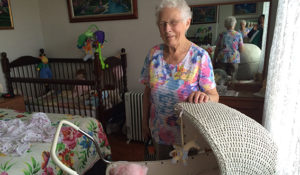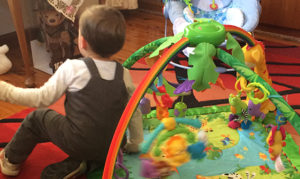Mother of all mothers, Marie Ross
By Neena Badhwar
She is 83-years-old, has survived breast cancer and chemotherapy, and has a condition called pulmonary embolism. Marie Ross, recently, had a hip operation, too.
All the usual problems associated with old age. One thing that sets her apart from many other old people is that her life is that of pure dedication and love. Marie does not live for herself. She is on a mission.
She is presently nursing a four-month-old baby, that, too, with Down Syndrome, as a pre-adoptive parent and a carer.
And this is not just one special need baby that Marie has looked after; she has, in the last forty-three years, cared for approximately 200 babies, mostly normal but at times special need kids, who have been placed in her home for a short-term care.
The babies remain in her care until the Department of Community Services (DOCS) finds these kids families suitable to give them long-term foster care or even adopt them. Many children that Mrs Ross has looked after have been placed in good homes or at times they have gone back to their biological parents or kinship.
“These kids are lovely,” she says, and give tremendous happiness, especially the special need kids. “I attend many seminars and workshops to keep myself updated and also talk to nurses and doctors at Westmead Hospital and health clinics who have helped me with many a helpful advice.
“The doctors would say that if they can hold toys in both hands, it means they are progressing well. But if they drop one toy to hold another one when given then they are not growing. When these little achievements I see in the children I care for, those are very satisfying moments for me,” she says.
Marie Ross and her husband Bernard became members of Centacare and Barnardos and also registered with DOCS as foster carers when their younger daughter turned seven in 1973. They took in Kelly who came to them when she was just one month old due to a mother who had psychiatric issues and could not look after her.
Kelly stayed on till she was 13-years-old when she signed her own adoption papers to be with Mrs Ross. She is now a Social Worker with Life Without Barriers and gives talks about her adopted family and her positive upbringing.
Ross’s is a happy home full of toys, prams, mobiles and swings, a welcoming place where young babies are given refuge when there is no one to look after them: for several reasons, due to problem with birth parents, drugs, a mother too sick to look after her baby or parents with psychiatric issues.
The DOCS workers assess the situation and place these children in out-of-home care with people who can provide a safe, secure and happy environment for these kids. At times there can also be cases of sexual and physical abuse.
“I used to look after older kids but sometimes they can be a bit handful. So, I decided to look after only little kids and that, too, for short periods. Longest the kids have stayed is Kelly and Justin who have been with us now and are part of our extended family. For the last few years I have been looking after new-born babies as young as one-day-old when I pick them up from the hospital.”
The day we visit Ms Ross, I have gone with my neighbour who have little Kiran (not his real name), a happy, healthy two-year-old baby. Kiran was looked after by Ms Ross till he was eight months old when he found a home next door in permanent foster care.
We are flabbergasted that Kiran, on seeing Marie, first smiles, then puts his cheek right next to her as if he remembers her and her loving, nurturing home and care she when soon after his birth. One can immediately see the bond between this great grandmother and him.
“He was one-day-old but was one of the most beautiful little babies,” she says.
“When the child is found a home, the foster parents come and pick up the child and I have to help them with transition. It is only for 4-5 days or so when I demonstrate to them how to bathe the baby, feed and any other special requirements,” Marie says.
So does she come across any problem, any issues.
“I have had some babies with medical issues. There was one baby where he had to go through numerous operations to rectify a medical condition and all my time was spent visiting doctors and hospitals. That was quite a trying time. Also medical bills just pile up on you. You do get reimbursed but at times it can be a bit overwhelming,” she says.
Marie shows us her antique pram which she bought for her first child, a daughter who is now 57-years-old. “All the kids who came to our home have slept in this pram,” says this proud grandmother who has been honoured with an Order of Australia Member (OAM) and also nominated for many awards.
There are many letters and a pile of newspaper articles on her for providing care since almost 43 years ago when she became a carer with DOCS. Her husband Brandon passed away 16 years ago but Marie has plodded on looking after little ones.
One wonders if they keep her awake or cry which are normal issues with young children, the Down Syndrome baby now in her care sleeps 10-12 hours every night, Maries cuddles her, “She is a very good baby. We are taught how to hold her in a special way because they are to be looked after with care,” she says.
Not only has Marie made life better for these kids she has nurtured them with love and affection at a time when they are extremely vulnerable, needing 24-hour care and love. One can see the way she cares for them, a loving hug and a lap, is all they need.
Ms Ross has been given care of kids from different nationalities. She has looked after a boy whose mother was from Nepal and the father a Pakistani. The mother was refused visa to stay and she could not go back as her family clearly told her it was not good for their honour. They said to give up this baby born out of wedlock if she ever came back to Nepal. This boy is now five-years-old and has been placed with a family of three where the other two are of Australian and Indian backgrounds. Marie has also looked after a girl of Indonesian and Bangladeshi mix.
There is not enough data available but some children from Indian background are trickling in and ending up in foster care due to various reasons.
The most recent statistics from the Australian Institute of Health and Welfare (AIHW, 2015) show that, as of 30 June 2014, there were 43,009 Australian children living in out-of-home care.
The AIHW statistics show that 93per cent of all children living in out-of-home care in Australia are in home-based care. Of that figure, 41per cent are in foster care, 48.5per cent are in relative/kinship care and 3.9per cent are in other forms of home-based care.
The National Framework for Protecting Australia’s Children 2009-2020 (COAG, 2009) noted that while primary and secondary prevention are important, children who have suffered maltreatment must be afforded necessary support and services. Ultimately, the preference is for children to be safe and cared for in their own family, but where that is not possible, children require a sense of safety and stability.
Maries Ross is one great grandmother who is trusted, loving and exactly knows how to look after these kids. She gives me a beautiful poem about caring for a special need child:
“A meeting was held quite far from earth
”˜It’s time again for another birth’,
Said the angels to the Lord above,
”˜this special child will need much love’
His progress may seem very slow
Accomplishments he may not show and
He’ll require extra care
From the folks he meets way down there
He may not run or laugh or play
His thoughts may seem quite far away
In many ways he won’t adapt
And he’ll be known as handicapped
So let’s be careful where he’s sent
We want his life to be content
Find the parents who will do a special job
They will not realise right away
The leading role they are asked to play
With this child sent from above
Comes stronger faith and richer love
Soon they will know the privilege given
In caring this gift from heaven
Their precious charge, so meek and mild
Is heaven’s very special child.
- Anonymous
Marie says with a twinkle in her eyes as she nurses the little Down Syndrome bub, “They are a special gift really.”
(Foster Care Week is from September 11-17 when a picnic is held to celebrate, acknowledge and raise awareness of the invaluable work of foster carers in our community. Visit the Fostering NSW website for more information about becoming a foster carer: http://www.fosteringnsw.com.au/)
Short URL: https://indiandownunder.com.au/?p=7357


